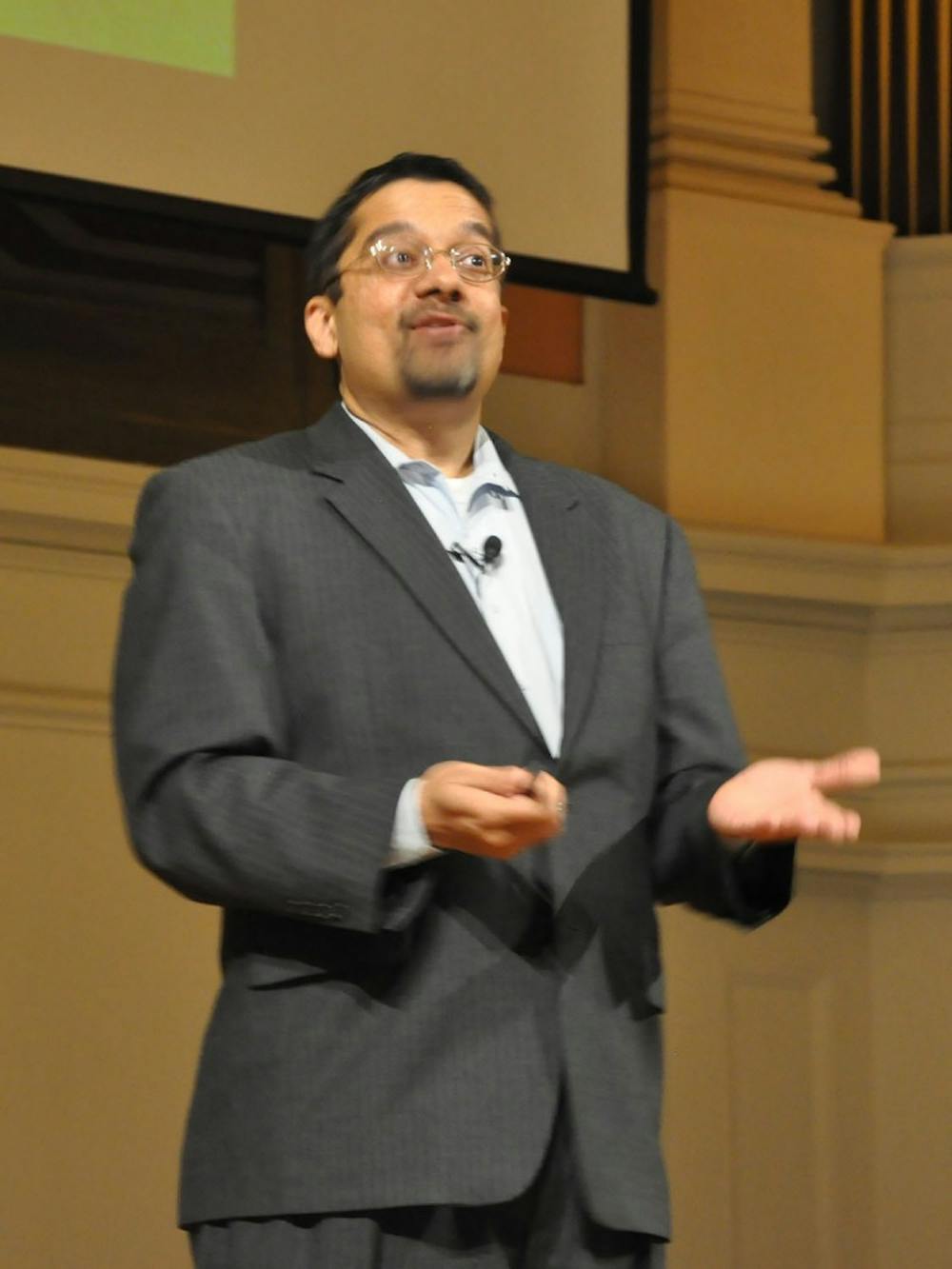Over 400 hundred students, faculty and community members gathered in Old Cabell Hall Thursday evening to listen to Shankar Vedantam, National Public Radio social science correspondent and host of the podcast “The Hidden Brain,” explain and discuss implicit bias.
The talk was the fourth in the Engineering School’s Excellence Through Diversity Distinguished Learning Series.
Vedantam covered a wide range of topics dealing with implicit bias throughout his talk but began by breaking down the concept. Human minds are constantly influenced by unconscious forces that affect our awareness and sometimes even actions. This is the unseen or hidden mind.
The subconscious functionings of the mind allow people to carry out daily tasks and make useful predictions about the world. However, Vedantam said, people often don’t resist the pull of the hidden brain.
“Many times when you have an unconscious bias of the brain … It requires a consistent effort to combat,” Vedantam said. “The hidden brain becomes powerful because it’s able to pull us along and we’re not pulling in the other direction.”
Vedantam shared a number instances where underlying biases have affected people's actions. He mentioned how teachers in schools in Tel Aviv, Israel scored female students — who performed at the same level as their male counterparts — lower than the boys on math tests. Another study found that identical resumes sent to top graduate schools, where only the gender of the name was different, offered the male applicants significantly higher salaries than the female applicants.
In an interview with The Cavalier Daily, Vedantam responded to the University’s decision to initiate an implicit bias module for first-year students, saying it’s important to consider how the tests are used and for what purpose. He suggested thinking of biases as disabilities, such as nearsightedness, in order to find a solution to fix them.
“If you think about these biases as disabilities, it’s really helpful to know what your disabilities are and to sort of know if you’re going to get glasses, what your prescription should be,” Vedantam said. “So in that sense, it’s useful.”
However, he cautions that implicit association test results should not be used to judge people.
“I think it’s really problematic on the other hand, if people are using this in some kind of fashion that evaluates other people, or basically sort of says, ‘Look, this person has this bias, so let’s make sure that they don’t do this kind of job,’” Vedantam said. “I think when you start using it in that kind of police state fashion, i’m not sure that’s a good idea at all.”
Vedantam also addressed the overt biases of the white nationalist rallies in Charlottesville in August. He finds that such acts of conscious bias take attention away from the other unfavorable acts that “good people” with unconscious biases engage in.
“Because there are many of these people and they are acting over large periods of time without being aware of it, the net effect … [is] that these unconscious biases play a much more profound role in our lives than the people who actually hold conscious biases,” Vedantam said.
The series began last year when John Gates became the Engineering School’s associate dean for diversity and inclusion. September marked the beginning of the second annual Excellence Through Diversity Distinguished Learning Series with a talk by scholar and public philosopher Cornel West.
Thomas Pilnik, programs coordinator for the Office of Diversity and Engagement in the Engineering School, said the series aims to affirm people’s beliefs in themselves and the community and offer a platform for a sense of belonging.
“The idea behind it is to create an affirming institution — an institution that sort of constructs this ideal that believes in the whole student and that liberates the potential of everyone involved,” Pilnik said.
Since its launch last year, the series has expanded to include sponsorship from various schools across the University including the Nursing School, Law School, Batten School and Curry School. Pilnik said the increased support demonstrates the event is reaching a wider audience.
“We’re giving the opportunity, not just for engineers, but for all students and community members … to feel like this is their Grounds, that this is their University, that this is their community,” Pilnik said. “So when we have speakers like Shankar, when we have speakers like Cornel West, you provide that breadth of experience and that voice and perspective.”
First-year Engineering student Kymberli Segres said Vedantam’s talk helped her more fully understand the implicit bias module she completed as a requirement for all first-year students.
“I really think he addressed a lot of points that people were really unsure about, especially the test that we took a few weeks ago,” Segres said. “A lot of people were saying that the order that it was put in, like how they attributed black with good or black with bad first, messed with the test, but he said … a lot of people have taken the test, he’s taken the test multiple times and it’s shown that even then it doesn’t really matter.”
The attendance figure in this article has been updated to note a final headcount of over 400 attendees.







